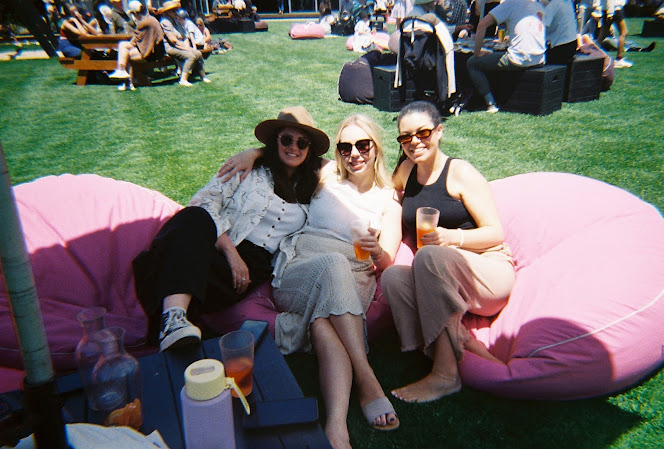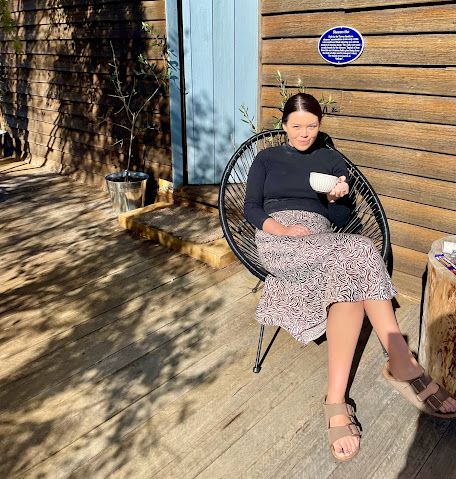To drink, or not to drink. Here's what two months of sobriety taught me...
It's no secret, we Aussies love to drink. But it wasn't until I committed to eight weeks of sobriety that I learnt just how deeply alcohol is embedded within our culture.
So why challenge myself to a dry spell? Well, I've been toying with the idea for some time now. Years, actually. My rubber arm derailing my alcohol-abstinent intentions with every wine I am offered at a dinner with friends.
At this point, I don't even feel like I get a say in the matter. My hypersensitive body deciding for me that it will no longer tolerate my binge-drinking habits. These days, an innocent beverage (or four) is enough to send my body into complete overdrive. Enduring relentless nausea and vomiting for up to 12 hours on any given hangover. I'm not telling you this to overshare. I'm doing so to connect with the reader who I know struggles with a similar issue. The reader who, too, has come to the sobering realisation that alcohol clearly isn't doing any favours for their body (or mind) anymore.
Google tells me I've developed alcohol intolerance. Mum tells me it’s just not worth it. My doctor tells me I should avoid it completely. Let's face the facts: alcohol drains my bank account. Exacerbates my anxiety. And intuitively, it just doesn't feel right anymore. All signs point to sobriety... so why do I feel such resistance towards swearing off the stuff? Maybe it's a fear of missing out; my tendency to cave with peer pressure; or the simple fact that it's easier to exist at a social event with a drink in hand.
I take a look in the (figurative) mirror and ask myself some difficult questions. Do I even enjoy drinking anymore? What will I turn to instead of a glass of red to take the edge off? Who am I in a social setting without the confident sheen of that all-to-familiar alcohol buzz? I challenged myself to two booze-free months to find out. What follows; a recount of what this self-appointed social experiment taught me.
It won’t always be received well by others.
Opt for a Kombucha at a usually booze-fuelled event, and expect to be met with some resistance. You must be bored! Are you sure you don't want a drink? Come on, first round is on me! After one too many occasions of being quizzed on my sober choices, I was starting to get comfortable with the reality that some people won't understand it. There will be times where I feel like the odd one out. And that respecting my own boundaries was going to test my assertiveness. Mastering the art of politely yet firmly responding to drink offers with a simple 'No, thank you'. No over-explanation necessary. I decided that my drinking choices are nobody's business. It shouldn't affect how well I am received in a social setting. But perhaps most notably, I was fascinated by the fact that some people really struggled to comprehend that maybe I just didn't feel like drinking. In a society so deeply dependant on alcohol as a social lubricant, I was beginning to feel as if my experimentation with sobriety was a rebellious act.
It will make some people feel uncomfortable.
Say you’ve got yourself a hot date at a moody jazz bar. They peruse the wine list, whilst you order a mocktail. In that brief moment of silence where you await their reaction, you can almost hear the dialogue circling around in their mind: Do I need to drink? Am I comfortable surrendering to the inhibited chatter that alcohol induces in her sober company? If I do join her for an alcohol-free evening, am I still capable of having.fun? Challenging others to take a look at their own intentions around drinking, I witnessed on multiple occasions that showing up as the sober companion can make some people feel uncomfortable. But the right people won't be phased by it. Those ones, they know what a privilege it is to be in your fabulous company; intoxicated, or not. Note to self: Never succumb to the pressure of saying 'yes' to alcohol, purely to alleviate the discomfort your sober decisions create in another person.
The settings in which you enjoy socialising might change.
I'd love to tell you I'm that person who can thrive in a nightclub sober, but the reality of taking a break from alcohol has meant that my preferences for socialising are changing. With a higher affinity for social outings that involve nature, good food, or being in bed by a respectable hour. I've noticed that I am a lot quicker to pass up on invites that involve bar hopping or booze-fuelled festivals. Maybe this is because I no longer feel inspired by the prospect of mingling within an inebriated crowd. Or maybe it's because my social anxiety is heightened without the comforting mellow of alcohol in my system. Managing sobriety in usually-drunken settings can feel tricky, and I have the humility to admit that this area is still a work in progress for me. While dancing on a bar sober is a type of confidence I can only aspire to, I do think there is something to be said about finding the sweet spot between keeping up appearances and honouring that some social settings just won't be as enjoyable anymore. And that's perfectly okay.
Your body will thank you for it.
Ever noticed that a weekend on the sauce always seems to be accompanied by an array of unhealthy habits. Channeling your inner vampire; you draw the curtains, dissolve into the couch, and cocoon yourself in a Netflix cave. Recovering, yet again, from the self-inflicted misery that a hangover induces. Dipping my toe in sobriety has given me a taste of the good life. Nowadays, I can spend the afternoon soaking up the beautiful scenes of a winery and drive home afterwards. Attend a gig and feel fresh for a morning walk the following day. My sleep feels less disturbed. My mind, more agile. And I’m over the moon to report that hang-anxiety is a thing of the past. The clincher: I feel a whole lot better for it.
Does this mean I will commit to a life sentence of sobriety? Not likely. But it has taught me that I can survive without alcohol. Thrive, even. Oh, and that Pablo’s Cocktails & Dreams knows how to mix a killer Lime d’ Coconut.
Contemplating alcohol abstinence for yourself? Get your hands on.a copy of 'Higher Sobriety' by Jill Stark. An intriguing memoir that chronicles an Australian journalist's experience with embarking on a year of sobriety.
If you struggle with your relationship with alcohol; know there are people that can help. Speak with your doctor, therapist, local AA group or call lifeline on 13 11 14.




Comments
Post a Comment